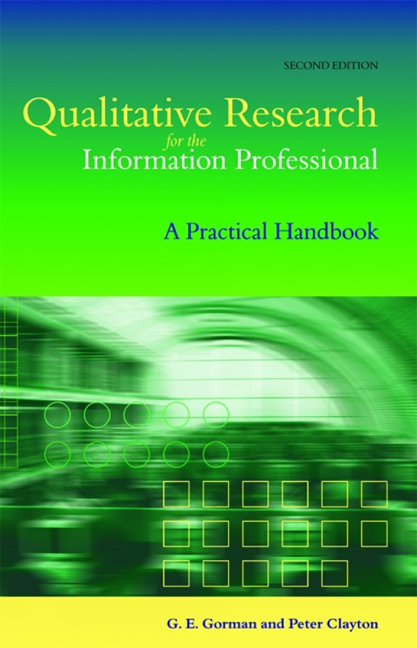Book contents
- Frontmatter
- Contents
- Tables, figures and research scenarios
- About the authors
- Preface to the second edition
- 1 The nature of qualitative research
- 2 Evaluating qualitative research
- 3 Qualitative research design in information organizations
- 4 Case studies in information organizations
- 5 Laying the foundations for fieldwork
- 6 Beginning fieldwork
- 7 Observation
- 8 Interviewing
- 9 Group discussion techniques
- 10 Historical investigation
- 11 Recording fieldwork data
- 12 Analysing qualitative data from information organizations
- 13 Writing qualitative research reports
- 14 Human resources in knowledge management: a case study
- Select bibliography
- Index
10 - Historical investigation
Published online by Cambridge University Press: 08 June 2018
- Frontmatter
- Contents
- Tables, figures and research scenarios
- About the authors
- Preface to the second edition
- 1 The nature of qualitative research
- 2 Evaluating qualitative research
- 3 Qualitative research design in information organizations
- 4 Case studies in information organizations
- 5 Laying the foundations for fieldwork
- 6 Beginning fieldwork
- 7 Observation
- 8 Interviewing
- 9 Group discussion techniques
- 10 Historical investigation
- 11 Recording fieldwork data
- 12 Analysing qualitative data from information organizations
- 13 Writing qualitative research reports
- 14 Human resources in knowledge management: a case study
- Select bibliography
- Index
Summary
FOCUS QUESTIONS
• What are the distinguishing characteristics of historical investigation?
• What are the range and nature of historical sources?
• How does the researcher interpret historical evidence?
• How can historical research be combined with other qualitative methods?
Why historical investigation?
The noted American bibliographer and book historian G. Thomas Tanselle once said that ‘History is a subject about which everyone seems to have a heated opinion, including the determination to ignore it.’ Chapter 3 noted that historical research in the information profession has been employed primarily to build organizational case studies and recover life histories celebrating the profession's heroes and heroines. This chapter will demonstrate the ongoing relevance and importance of historical research to address key issues, both past and present, in the context of library, archive, knowledge management and other information services.
Definitions of history and methods of historical practice are multiple, often contradictory, and vehemently defended. John Tosh, in his eminently readable work The Pursuit of History: Aims, Methods and New Directions in the Study of Modern History, notes that history is both what happened in the past and how that past is represented in the writings of historians. It is a disciplined and systematic form of enquiry, which combines the strengths of both humanities and social science research. History places the nature, value and interpretation of historical information sources centre-stage. As such, it enables valuable links to be made between past and present: between the variety of human mentalities or achievements and their relation to current manifestations; between the historical impact of change and its future implications; between the social, political or popular construction of what happened and its relationship to specific events.
In any organization it is impossible to understand the present situation without an appreciation of the past, of the organization's history. Moreover, if one is concerned with change, historical perspective is vital both in providing a realistic idea of what might be feasible and in revealing any distorted representations of the past that may be obstructing change.
- Type
- Chapter
- Information
- Qualitative Research for the Information ProfessionalA practical handbook, pp. 160 - 181Publisher: FacetPrint publication year: 2004
- 1
- Cited by



